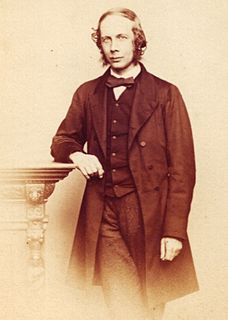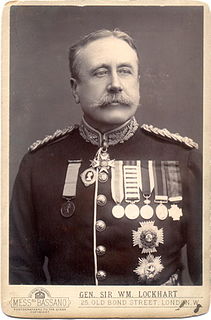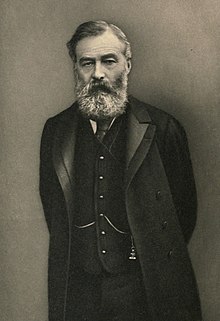
Sir James Fitzjames Stephen, 1st Baronet, KCSI was an English lawyer, judge, writer, and philosopher. One of the most famous critics of John Stuart Mill, Stephen achieved prominence as a philosopher, law reformer, and writer.

Sir Henry James Sumner Maine,, was a British Whig comparative jurist and historian. He is famous for the thesis outlined in his book Ancient Law that law and society developed "from status to contract." According to the thesis, in the ancient world individuals were tightly bound by status to traditional groups, while in the modern one, in which individuals are viewed as autonomous agents, they are free to make contracts and form associations with whomever they choose. Because of this thesis, Maine can be seen as one of the forefathers of modern legal anthropology, legal history and sociology of law.

George Frederick Samuel Robinson, 1st Marquess of Ripon,, styled Viscount Goderich from 1833 to 1859 and known as the Earl of Ripon in 1859 and as the Earl de Grey and Ripon from 1859 to 1871, was a British politician and Viceroy and Governor General of India who served in every Liberal cabinet between 1861 and 1908.

Albert Venn Dicey,, usually cited as A. V. Dicey, was a British Whig jurist and constitutional theorist. He is most widely known as the author of Introduction to the Study of the Law of the Constitution (1885). The principles it expounds are considered part of the uncodified British constitution. He became Vinerian Professor of English Law at Oxford, one of the first Professors of Law at the London School of Economics, and a leading constitutional scholar of his day. Dicey popularised the phrase "rule of law", although its use goes back to the 17th century.

Arthur Hobhouse, 1st Baron Hobhouse was an English lawyer and judge.

The Indian Councils Act 1909, commonly known as the Morley–Minto or Minto–Morley Reforms, was an act of the Parliament of the United Kingdom that brought about a limited increase in the involvement of Indians in the governance of British India. The act introduced elections to legislative councils and admitted Indians to councils of the Secretary of State for India, the viceroy, and to the executive councils of Bombay and Madras states. Muslims were granted separate electorates. Indian nationalists considered the reforms too cautious and Hindus resented the introduction of separate Muslim electorates.

The Government of India Act 1919 was an Act of the Parliament of the United Kingdom. It was passed to expand participation of Indians in the government of India. The Act embodied the reforms recommended in the report of the Secretary of State for India, Edwin Montagu, and the Viceroy, Chelmsford. The Act covered ten years, from 1919 to 1929. This Act represented the end of benevolent despotism and began the genesis of responsible government in India. It was set to be reviewed by the Simon Commission in 10 years.

General Sir William Stephen Alexander Lockhart was a British General in the British Indian Army.

Sir William Reynell Anson, 3rd Baronet, was a British jurist and Liberal Unionist turned Conservative politician from the Anson family.

Victor Alexander George Robert Bulwer-Lytton, 2nd Earl of Lytton,, styled Viscount Knebworth from 1880 to 1891, was a British politician and colonial administrator. He served as Governor of Bengal between 1922 and 1927 and was briefly Acting Viceroy of India in 1926. He headed the Lytton Commission for the League of Nations, in 1931–32, producing the Lytton Report which condemned Japanese aggression against China in Manchuria.

The Ilbert Bill was a bill formally introduced on 9 February 1883 during the Viceroyship of the Marquess of Ripon, which was drafted by Sir Courtenay Peregine Ilbert, the legal member of the Council of the Governor-General of India. It concerned the jurisdiction of Magistrates or Sessions Judges to try charges against "European British subjects" if they were themselves not European.

Sir Richard Garth PC QC was Member of Parliament for Guildford from 1866 to 1868 and Chief Justice of Bengal from 1875 to 1886.
Sir Frederick Francis Liddell was a British lawyer and civil servant. He is noted for being First Parliamentary Counsel.
The Office of the Parliamentary Counsel (OPC) is responsible for drafting all government Bills that are introduced to Parliament. Established in 1869, the OPC has been part of various departments and is currently part of the Cabinet Office. Led by Elizabeth Gardiner, the First Parliamentary Counsel and Permanent Secretary, the OPC consists of 60 members of staff, 47 of whom are lawyers and 13 of whom are support staff. The lawyers who work in the office are referred to as Parliamentary counsel or Parliamentary draftsmen.
Legislative Methods and Forms is a 372 page book written by Sir Courtenay Peregrine Ilbert and published by Oxford in 1901. "It is a description of the rivalry between common and statute law, with special reference to the details of preparation, passage and codification of statutes in Great Britain and her colonies. The book also contains a complete and interesting collection of statutory forms for bills on various subjects commonly treated by Parliament." Donald Raistrick said it is useful. James Bryce said: "It is full of valuable information and acute remarks upon modern English legislation, and brings together a mass of historical facts never previously collected." "The chapter on 'Parliament as a Legislative Machine' will be interesting to the lay reader as well as to the publicist." By 1915, the book was "well known". By 1957, it had "fallen into an unmerited neglect".
The Government of India Act 1912 was an act of the Parliament of the United Kingdom, which made changes to the governance of British India. It received royal assent on 25 June 1912.

The Government of India Act 1915 was an act of the Parliament of the United Kingdom, which consolidated prior Acts of Parliament concerning British India into a single act. It was passed in July 1915 and went into effect on 1 January 1916.
Sir Arthur Theodore Thring, KCB, DL was an English lawyer, parliamentary draftsman and parliamentary clerk.
The European and Anglo-Indian Defence Association was a pressure group formed in British India. The group's founder and president was the industrialist John Johnstone Jardine Keswick. The Association has been described as "primarily, the political party of India’s non-official British". The Association was particularly well-known for opposing the Ilbert Bill, and was criticised as a "Defiance" Association. Several tea and Indigo planters were members of the Association.












